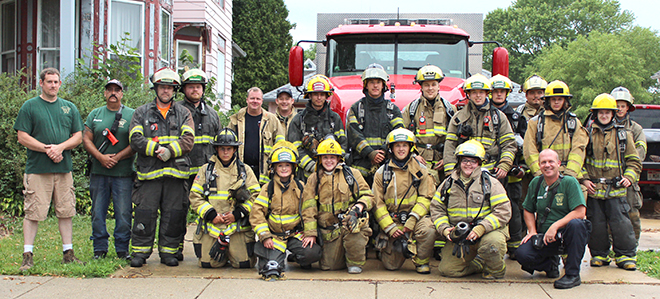Firefighter Explorers meetings restart

ANNE EICKSTADT PHOTO Belvidere Republican
Firefighter Explorers youth and trainers gather for a pic by the fire engine before the training work begins.
By Anne Eickstadt
The Boy Scout Explorer programs are interactive, worksite-based career education program of Learning for Life, an affiliate of the Boy Scouts of America. Participants in the program are called Explorers. The program serves youth in 6th to 8th grades and young men and women who are 14 through 20 years old. Explorer units usually focus on a single career field, but can also introduce youth to a variety of career fields.
In Boone County, Boone County Fire District 3 and the Belvidere Police Dept. have hosted Explorer groups for many years.
“The Explorer program was created to give high school age kids the opportunity to train as firefighters before they are eligible to become firefighters,” said Poplar Grove Fire Dept. Captain Tim Davis. “It is intended to let them see if firefighting is a field that they would be happy in.
“We train them the same way as we train our firefighters so they can have realistic experience. The Explorers have their own rank structure just as the fire department does.”
“The kids learn all about the equipment a firefighter uses,” said Firefighter/Explorer trainer Frankie Perez. “The kids can practice getting in and out of their kit, see how different air masks and air tanks need to be handled, check out the controls on the engines and other vehicles, work with the fire hose, and learn everything a rookie firefighter needs to know.
“Fire departments hire new people as needed. Some of them need a lot of additional training before they can fully function as part of the team. Our Explorers, have already had a lot of training and can smoothly join the firefighting team while only needing to learn that particular team’s methods and habits. Several of our Explorers have been hired by local fire departments in the last few years.”
The Belvidere Fire Dept. And all the Boone County Fire Districts rotate the Explorers from station to station so they can get a wider range of experience and instruction types. The availability and cross-training with all the departments in the county broadens their horizons and does even better job of preparing them for a future career in fire services.
On Tuesday, July 21, the Belvidere Fire Dept. was the host as the Explorers began their meetings and training again now that the coronavirus shutdown has opened up. Chad Cunningham of the BFD and the other Explorer trainers prepared an unused house they have permission to utilize for training. They blacked out the upstairs and planted several dummy ‘victims’ for the Explorers to locate in a Search and Rescue training segment. They ensured the rest of the house was solid and safe enough for maneuvers for the attack crews and arranged for EMA to bring their truck and new volunteers for the training to recharge air tanks for the evening.
As the host trainer for the evening, Chad Cunningham took point, explained the evening’s objectives and briefly reminded the youth of how to run a search and rescue. “Where are you most likely to find victims? By windows and doors – the points of egress if they are awake. In bed, if they were overcome by smoke while asleep. Every room will have a door and a window. Know your landmarks, stay oriented, be aware of your way out if you get trapped by flames, maintain good communication and keep track of each other.
“The primary search is very quick, the secondary search will take longer. The search crew can help the attack crew dragging hoses in to fight the fire. If the attack crew does not find a fire, they report that fact and switch to a primary search team.”
A trainer stayed at the top of an unused stairwell to protect the youth from an unwary step in the darkness. The group was fully kitted with uniform, helmet, and air masks and tanks. They were divided into three teams. One team went upstairs for search and rescue, reporting each ‘victim’ as they found one. The other two teams began pulling charged hoses (hoses filled with water) into the house – one team through the front door and the other team into the basement.
After the first exercise, the teams sat down with the trainers and discussed what went right, what went wrong, what could have gone better, and asking questions. “There are no stupid questions,” one trainer said. “You may run into a situation in the future where you will wish you knew the answer as you are fighting a raging fire. Every day is a learning experience. If you ever think you know it all, that’s the day to retire.”
“I got complacent,” said another firefighter. “My buddy left the room and my foot got stuck. I fell backward and my helmet flew off. I was lying in the fire and starting to panic when I remembered my training. I managed to free myself and get out. If not for that training, I wouldn’t be here today. Here’s what that looks like.” He showed them pictures.
When the teams completed their exercise analysis, they rendezvoused at the EMA truck to get bottles of water to re-hydrate and have their air tanks recharged before starting another exercise and, thereby, giving the Explorers more experience in the basics of firefighting.


